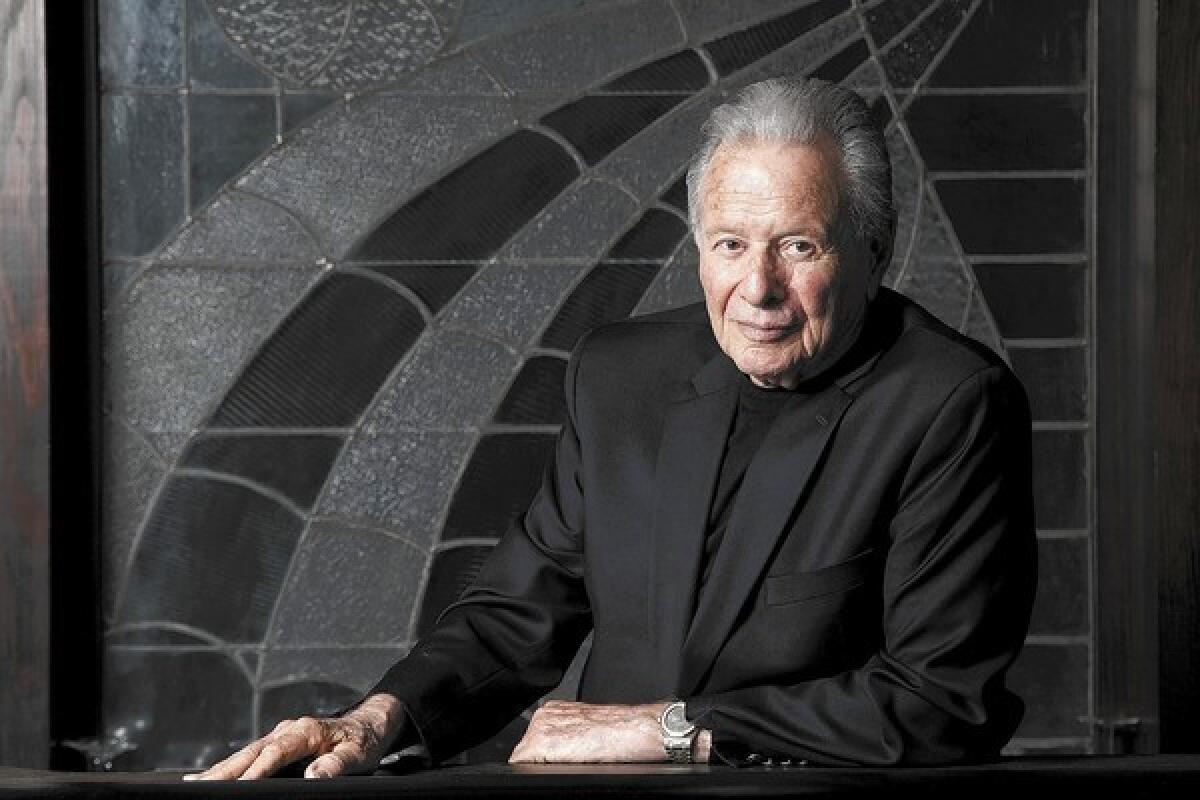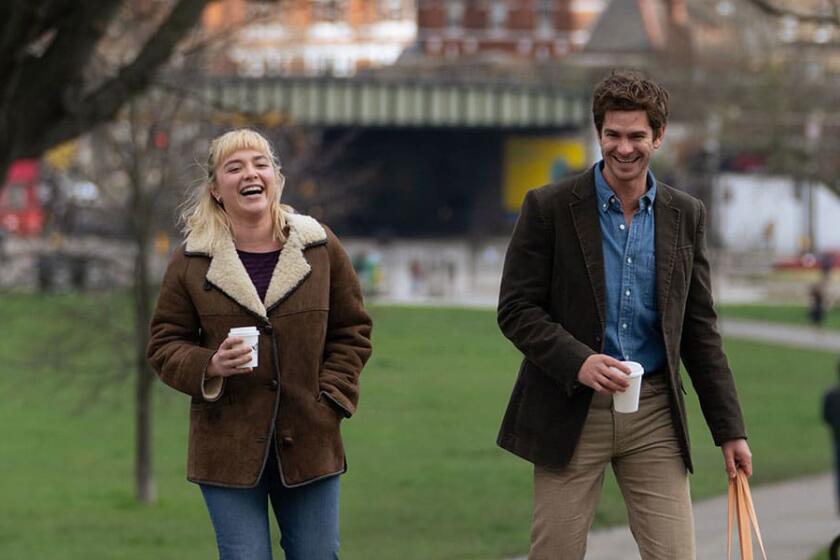Mace Neufeld: Constant as the stars

The parrot wasn’t talking.
“I’m teaching her to say, ‘I miss Mace,’’’ said Mace Neufeld, who at 85 reckons the bird, whose name is Margie, will outlast him.
With no words of affection forthcoming, Neufeld, a New Yorker who landed in Beverly Hills back when you could grab a sandwich at the Ontra Cafeteria and rent a house with a pool for $300 a month, headed toward the sitting room. He once wrote music for Dorothy Loudon, managed Dusty Springfield, produced “The Omen.” But Neufeld moves with the fervor of a man less concerned with his legacy than the spread sheet of his latest film.
“Jack Ryan: Shadow Recruit” stars Chris Pine, the young star with the earnest air who personifies a new era for the $800-million franchise. Neufeld has seen scrapbooks full of heartthrobs and lived through plenty of eras, from the death of the studio system to the rise of conglomerates and armies of marketers. He reached for a cookie as Margie chirped from the library.
“The big, big stars of the old line are gone,” he said. “I remember watching ‘Titanic’ at a friend’s house. Kirk Douglas was there, Greg Peck and Jack Lemmon and … Walter Matthau. I looked around the room and thought to myself, ‘You know, when these guys are gone that’s the last of the studio-made stars.’ But, of course, Kirk is still around, remarkably.”
A man’s past is often tacked on his walls — paintings, art and unexpected moments that crystallize in memory. Tucked in a corner is the picture Neufeld snapped in 1944 of a soldier on crutches returning from World War II to the embrace of his mother. He was a teenager photographing clothes in a department store when he spotted the veteran and ran across 15th Street in Manhattan. The picture has retained its power, a black-and-white image from a time of presumed innocence, when America had prevailed and Hollywood was capitalizing on romance and postwar redemption.
The days of “It’s a Wonderful Life” and “An American in Paris” vanished long ago, sobered by the realism of the 1960s and a new wave of filmmakers who would re-invent how movies were shot and financed. Hollywood is making fewer films, but the unpredictable alchemy of profits and losses hasn’t changed even as budgets are scrutinized down to the last credit and producers start from scratch on every script.
REVIEW: ‘Jack Ryan: Shadow Recruit’
“I thought the old system was great,” said Neufeld, who has brought four Tom Clancy novels with Jack Ryan as protagonist to the screen, including “The Hunt for Red October.” “I came in when the major studios were falling apart. I would have loved to have been here when everybody was under contract … and you went from one picture to another.”
He sipped coffee in his Mediterranean-style home. Trimly dressed in shades of a midnight sky, his loafers buffed, Neufeld has a trainer and swims three days a week. A housekeeper peeked in and vanished; a pool shone beyond patio doors. Silver-black hair so neat that one had the inclination to muss it, he noted that he admired how Clint Eastwood, who directed the Neufeld-produced “Invictus,” did only one or two takes of a scene. Saves time and money.
A phone rang.
“Is that me?” He reached into his pocket and clicked the silence button.
“It’s not easy to get a major film these days,” said Neufeld, who was called in to get the script in shape and oversee set locations on “Sahara,” starring Matthew McConaughey, which had been plagued by pre-production cost overruns before its 2005 release. “The marketing cost is so high. ... Marketing is locked in with production right from the get-go.” He added that marketers critique scripts, suggest budgets and are “always looking for trailer moments. ... We used to call Ryan movies ‘thinking man’s thrillers.’ Now, it’s a thinking man’s action thriller.”
BEST MOVIES OF 2013: Turan | Sharkey | Olsen
Neufeld can sound like a cattle rancher in an old western, his dreams tempered with pragmatism. He has three children. His wife of 41 years died in 1995. He remarried nine years ago. When you lay it all out — life and art and the moments in-between — it comes down to “just survival, I think. You go out and find good material and you stick with it and don’t give up on it. ... I’m still looking for an Academy Award. If I stay around long enough it might happen.”
“Mace is an old-style gentleman producer,” said Kenneth Branagh, who directed and also plays the Russian villain in “Jack Ryan.” “I’ve no doubt Mace has gotten into scraps. You don’t get to where Mace has been without being tough. He was on our set every single day. As a producer he’s careful with the dough. He has an almost puckish kind of delight, a gleeful pleasure in making movies.”
Yale classmates
The son of a stockbroker, Neufeld grew up in New York City and studied 17th century metaphysical poetry at Yale. Future President George H.W. Bush and future director Alan Pakula were in his senior class. Neufeld was speaker at his 65th reunion last year. “Bush was too fragile to come down,” he said, “so they asked me, the only guy in show business.”
After graduating, Neufeld and a partner composed music in the early 1950s: “We’d write every night and then go down to the Brill Building in the morning to try and sell our songs,” he said, adding that he didn’t have a big hit, but Sammy Davis Jr. recorded his “Blues to End the Blues,” and Dorothy Loudon hired him as a manager.
His management business — he represented musicians and actors, including Don Knotts, Chaka Khan and Jim Croce — brought him to Los Angeles.
PHOTOS: Actors who have played Jack Ryan
“June 10, 1962, at 1:30 in the afternoon I landed here with two little boys and my wife with not a lot of money but an office. I never looked back,” he said. His first Hollywood premiere was “Lawrence of Arabia.”
He switched from management to film and TV in the 1970s, producing “The Omen,” which starred Gregory Peck and redefined the notion of creepy little boys, and the television miniseries “East of Eden.” In 1990, he turned Tom Clancy’s “The Hunt for Red October,” a tale about a Soviet submarine captain seeking to defect with the help of CIA analyst Jack Ryan, into a hit. That led to a succession of Jack Ryan films, including “Patriot Games,” starring Harrison Ford, and “The Sum of All Fears,” starring Ben Affleck.
Ryan — virtuous, indefatigable, quick of mind — has protected America from its evolving fears: the Cold War, drug cartels, nuclear trafficking and, in the franchise’s latest incarnation, which was distributed by Paramount, a terrorist attack and a Russian plot to crash financial markets. The film did not receive rave reviews and was overshadowed at the box office by “Ride Along,” “Lone Survivor” and “The Nut Job.”
Ryan has become a kind of fictional son — or perhaps alter ego — to the producer. Branagh said Neufeld was adamant that budget constraints would not force cutting a costly helicopter crash scene that was integral to Ryan’s backstory. “He definitely stood up about that,” the director said. “He does use his sage maturity. He said, ‘The helicopter must stay in.’”
PHOTOS: Box office top 10 of 2013
Next up for Neufeld is “The Equalizer,” starring Denzel Washington and based on the TV series about a retired intelligence officer. Another man of intrigue in the lens but Neufeld, who before filming “The Hunt for Red October” was invited by the U.S. Navy on a six-day submarine trip, has produced a diverse list of more than 40 films and television shows.
“I guess,” he said. “I never counted.”
He did recall, though, when he almost signed John Wayne. He was producing “The Frisco Kid” starring Gene Wilder in the late 1970s. He wanted Wayne to play the outlaw. The actor, who by then epitomized the creaky gunslinger, agreed but later refused to defer his $750,000 fee and backed out, Neufeld said.
“He got insulted,” he said. “It was a great disappointment. He would have been great.”
That brought to mind Neufeld’s consuming, if unrequited, passion, better known as “The Outrider.” It’s a tale set in the late 1800s about a hanging judge and a deputy tracking a notorious bad guy in the Oklahoma Territories. Neufeld, who has a star on the Hollywood Walk of Fame, has shopped the script for 15 years.
“It’s almost impossible to get a western made. They don’t play well internationally,” he said. “But I keep trying. ... I figure I’ll continue doing movies as long as I can tie my own shoelaces.”
He sat amid African wood carvings. A portrait of Frida Kahlo looked out to the pool. Margie chirped but uttered nothing. Gardeners swept grass clippings in the neighborhood where he has lived for half a century. All was neat; palms rose in tall, perfect lines. He looked around the room. It had been many years since he hurried through New York with the scrap of a song in his hand.
The house fell quiet. Even on such a street, a man over time distills certain realities into wisdom: “It’s not that you’re only as good as your last film. It doesn’t matter what your last film was.”
More to Read
Only good movies
Get the Indie Focus newsletter, Mark Olsen's weekly guide to the world of cinema.
You may occasionally receive promotional content from the Los Angeles Times.










